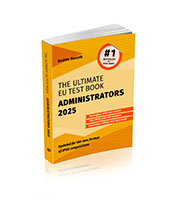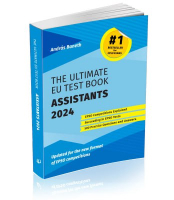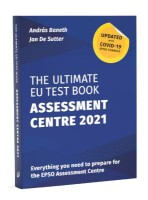Key features
Who is this book for?
The Administrators 2025 edition is
designed for candidates in EPSO AD-
level open competitions. It includes
test types also found in CAST
selections and internal competitions.
What does it include?
Chapter 1. EU Administrator selection competitions
Who the EU Administrators are and
how they are selected; what the
2025 format EPSO competitions
involve; online testing; language
rules; choosing your competition;
CAST selections and internal
competitions; tips to succeed.
Chapter 2. Succeeding in Verbal Reasoning Tests
How to take these tests – the
hazards to avoid and the skills and
techniques you need.
Chapter 3. Verbal Reasoning Test
100 AD-level practice questions, with
explanations showing which answer
options are wrong, and why.
Chapter 4. Succeeding in Numerical Reasoning Tests
The essential mathematical
operations you need to master and
the mistakes you need to avoid, with
worked examples.
Chapter 5. Numerical Reasoning Warm-Up Exercise
“Warm-up” exercise of 45 selected
questions designed to explain order
of magnitude, per
capita/percentage calculations,
speed, time and distance, equations,
ratios and estimating.
Chapter 6. Numerical Reasoning Test
120 mixed-type questions, with
detailed answers showing all the
calculations required from start to
finish, the commonly made errors
and the shortcuts you can take.
Chapter 7. Succeeding in Abstract Reasoning Tests
Many are confused by abstract
reasoning tests – this chapter shows
how such tests are designed, the
essential operations and key rules to
master.
Chapter 8. Abstract Reasoning Test
50 questions with step-by-step
solutions. The focus is on systematic
elimination of incorrect answers to
improve your accuracy and speed
when working under pressure.
Chapter 9. Succeeding in Field-
Related MCQs
Multiple-choice questions in the field
of the competition are a standard
feature in specialist competitions.
The chapter explains how to prepare
for questions designed to probe your professional knowledge and how it might
be applied in the EU administration.
Chapter 10. EU Knowledge Test
EU knowledge testing is back as a
way of assessing candidates’
commitment to working for the EU
and understanding of its institutions,
procedures and policies. The
chapter has a 200-question test.
Chapter 11. Digital Literacy Tests
This is a new type of test which could
occur in some AD competitions. We
look at what it is likely to involve.
Chapter 11. The EPSO Written Test
The written test has since 2024 replaced
the case study. This is a test of your ability
to communicate in writing. The chapter
explains what the examiners are assessing
and how best you can prepare.
Chapter 13. Sample Written Test
Practice is vital in preparing for the written
test. The chapter shows how to
systematically construct an effective written
test answer.
Chapter 14. Interviews and other
Oral Tests
To actually get a job, all candidates face
interviews, and possibly other oral tests, by
the recruiting institutions. This chapter
tackles this final hurdle − what to expect,
the mistakes to avoid, and the key
messages you need to get across.

Who is this book for?
Candidates for all EPSO AST and AST-SC exams as well as
equivalent-level CAST exams.
What does it include?
Chapter 1. EU Assistants Selection Competitions
Who the Assistants are and how EPSO selects them since the major changes made in 2023/24: test
types, chances of succeeding by competition, language rules, remotely proctored tests, competency
framework and end of Assessment Centres, reserve list and recruitment. PLUS, contract agent (CAST)
selections and internal competitions.
Chapter 2. Succeeding in Verbal Reasoning Tests
How to take these tests – the hazards to avoid and the skills and techniques you need.
Chapter 3. Verbal Reasoning Tests
150 AST-level practice questions, with explanations showing which answer options are wrong, and why.
Chapter 4. Succeeding in Numerical Reasoning Tests
The essential mathematical operations you need to master, and the mistakes you need to avoid.
Chapter 5. Numerical Reasoning Warm-Up Exercise
45 questions where you are given the answers straight away, designed to strengthen skills in order
of magnitude, per capita/percentage calculations, speed, time and distance, equations, ratios and
estimating.
Chapter 6. Numerical Reasoning Test
120 AST-level practice questions with detailed answers showing all the calculations required from
start to finish, the commonly made errors and the shortcuts you can take.
Chapter 7. Succeeding in Abstract Reasoning Tests
Many are confused by abstract reasoning tests – this chapter shows how such tests are designed, the
essential operations and key rules to master.
Chapter 8. Abstract Reasoning Warm-Up Exercise
Step by step guide to solving 25 individual worked examples. The focus is on systematic elimination
of incorrect answers to improve your accuracy and speed when working under pressure.
Chapter 9. Abstract Reasoning Test
110 AST-level practice questions, testing typical series, with answers explaining the rules applied
so you can work backwards to see where you went wrong.
Chapter 10. EU Knowledge Test
Explanation of this new test type for AST generalists, with 50 practice questions
Chapter 11. The Written Test
This test, in its revised 2024 format, can be expected in all AST competitions to assess the written
communication competency. The chapter explains what exactly is being tested and what the examiners
will be looking for.
Chapter 12. Prioritising and Organising Test
69 questions testing your ability to choose the correct or the best option in realistic office
scenarios where competing priorities, budgets, people resources and schedules are involved.

The EPSO Assessment Centre has been
abolished and this book is no longer in
print. However, the book’s coverage of
competencies, and the exercises that
EPSO used to assess them, can still be accessed in an ebook at:
The Ultimate
EU Test Book Assessment Centre 2021 -
John Harper Publishing.

Published January 2022
Please note: This book is based on the EPSO competency framework in use until 2023. Some changes have since been made, although most of the essential aspects are unaffected.
Who is this book for? All EU staff, whether permanent, temporary or contract, stagiaires, assistants and anyone planning an EU career.
What does it include? The competencies – or “soft skills” –sought by the EU institutions, what they are, and how to improve your own performance for career success.
Coach, trainer and former EU official Jan De Sutter draws on the best ideas and practice in current management thinking and applies them to the specific context of EU institutions, explaining how the various competencies fit into the EU system for staff selection, appraisal and promotion. Individual chapters explain what each competency is about, and its related “behavioural anchors”, moving on to insights and practical tips for self-improvement.
Chapter 1. Working for the EU
The many types of jobs in the EU administration, trends in recruitment and career prospects.
Chapter 2. Know Yourself to Understand Others
Personality types, different types of intelligence, and motivation.
Chapter 3. Analysis and Problem Solving
Systematic approaches to problem solving, teamwork, different types of thinking, implementation.
Chapter 4. Communicating
Oral communication, speaking in public; written communication, how to create good messages and
documents; techniques for engaging your audience.
Chapter 5. Delivering Quality and Results
Defining quality; time and performance management, meeting and exceeding expectations.
Chapter 6. Learning and Development
Hard skills and soft skills, types of learning, learning and development in the EU context.
Chapter 7. Prioritising and Organising
Managing time, projects, critical paths, multitasking, planning tools.
Chapter 8. Resilience
Adapting to change, coping with stress, operating outside your comfort zone.
Chapter 9. Working with Others
Group dynamics, combing different personality types, handling meetings, being assertive.
Chapter 10. Leadership
Leaders versus managers, different leadership styles and theories, motivating others, delegating,
receiving feedback.
Chapter 11. Digital persuasion Learn how to communicate effectively in the digital era – from emails to digital presentations and meetings, and how to set up a home office
Chapter12. Teleworking Meeting the special challenges of remote working and how to apply and demonstrate your competencies when working from home.
Chapter 13. United in Diversity? The EU administration faces increasing challenges around diversity issues. Be aware of your mental programming and understand how to work with and benefit from diversity
ANNEXES
Annex 1 Competencies, Anchors and Indicators
Annex 2. Glossary
Annex 3. Bibliography
